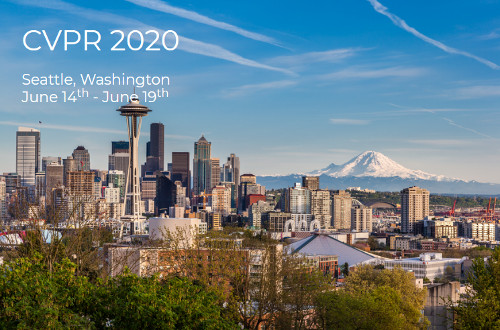cvpr2020.thecvf.com
Seattle, USA
Date: 2020/06/15 8:30AM-5:00PM
2020 Low Power Computer Vision Competition Winners Announcement
LPCVC 2020 Overview
The 2020 CVPR Workshop of Low-Power Computer Vision Challenge was succesfully hosted on 15 June 2020 in Seattle, USA. This workshop featured the winners of the past Low-Power Image Recognition Challenges, invited speakers from academia and industry, as well as presentations of accepted papers.
The LPCVC features 3 tracks sponsored by Facebook, Xilinx, and Google will be hosted online. The challenge will be open for submission from 7/1/2020 - 7/31/2020. More details are posted below. Please join the online discussion forum lpcvc.slack.com.
Tracks
How to participate: Login on this website to participate in the following trakcs. A registered account is free to participate any tracks. Detailed instruction can be found on the corresponding information page.
Program Recordings
| Time | Speaker |
|---|---|
| 06:00 | Organizers and Sponsors’ Welcome
|
| 06:05 | History of IEEE Low-Power Computer Vision Challenge, Terence Martinez, IEEE] |
| 06:10 |
Paper Presentations:
|
| 07:00 |
Poster Presentations:
|
| 07:10 | QA, Moderator: Ming-Ching Chang, SUNY Albany] |
| 07:30 | Invited Speeches:
|
| 08:15 | QA, Moderator: Carole-Jean Wu, Facebook |
| 08:30 | Invited Speeches:
|
| 09:15 | QA, Moderator: Jaeyoun Kim, Google |
| 09:30 | Invited Speech (Tools):
|
| 10:15 | QA, Moderator: Joe Spisak, Facebook |
| 10:30 | Panel: How can you build startups using low-power computer vision?
Moderator: Song Han, MIT Pnaelists:
|
| 11:30 | Adjourn |
Organizers
| Name | Role and Organization | |
|---|---|---|
| Hartwig Adam | hadam@google.com | |
| Mohamed M. Sabry Aly | IEEE Council on Design Automation, Nanyang Technolgical University | msabry@ntu.edu.sg |
| Alexander C Berg | University of North Carolina | aberg@cs.unc.edu |
| Ming-Ching Chang | University at Albany - SUNY | mchang2@albany.edu |
| Bo Chen | bochen@google.com | |
| Shu-Ching Chen | Florida International University | chens@cs.fiu.edu |
| Yen-Kuang Chen | IEEE Circuits and Systems Society, Alibaba | y.k.chen@ieee.org |
| Yiran Chen | ACM Speical Interest Group on Design Automation, Duke University | yiran.chen@duke.edu |
| Chia-Ming Cheng | Mediatek | cm.cheng@mediatek.com |
| Bohyung Han | Seoul National University | bhhan@snu.ac.kr |
| Andrew Howard | howarda@google.com | |
| Xiao Hu | manage lpcv.ai website, Purdue student | hu440@purdue.edu |
| Christian Keller | chk@fb.com | |
| Jaeyoun Kim | jaeyounkim@google.com | |
| Mark Liao | Academia Sinica, Taiwan | liao@iis.sinica.edu.tw |
| Tsung-Han Lin | Mediatek | Tsung-Han.Lin@mediatek.com |
| (contact) Yung-Hsiang Lu | Chair, Purdue | yunglu@purdue.edu |
| An Luo | Amazon | anluo@amazon.com |
| Terence Martinez | IEEE Future Directions | t.c.martinez@ieee.org |
| Ryan McBee | Southwest Research Institute | ryan.mcbee@swri.org |
| Andreas Moshovos | University of Toronto/Vector Institute | moshovos@ece.utoronto.ca |
| Naveen Purushotham | Xilinx Inc. | npurusho@xilinx.com |
| Tim Rogers | Purdue | timrogers@purdue.edu |
| Mei-Ling Shyu | IEEE Multimedia Technical Committee, Miami University | shyu@miami.edu |
| Ashish Sirasao | Xilinx Inc. | asirasa@xilinx.com |
| Joseph Spisak | jspisak@fb.com | |
| George K. Thiruvathukal | Loyola University Chiicago | gkt@cs.luc.edu |
| Yueh-Hua Wu | Academia Sinica, Taiwan | kriswu@iis.sinica.edu.tw |
| Junsong Yuan | University at Buffalo | jsyuan@buffalo.edu |
| Anirudh Vegesana | manage lpcv.ai website, Purdue student | avegesan@purdue.edu |
| Carole-Jean Wu | carolejeanwu@fb.com |
FAQ
- Q: Where can I sign the agreement form?
A: You should sign the agreement form when submitting your solution to any track. Each account only needs to sign it once. The agreement form is a legal binding document, so please read it carefully.
- Q: How can we register as a team?
A: One team only needs one registered account. You can indicate your team members when signing the agreement form.
- Q: How can I register for a specific track?
A: Registered accounts are not limited to attend any track. Accounts will be considered as participating a track when submitting a solution.







